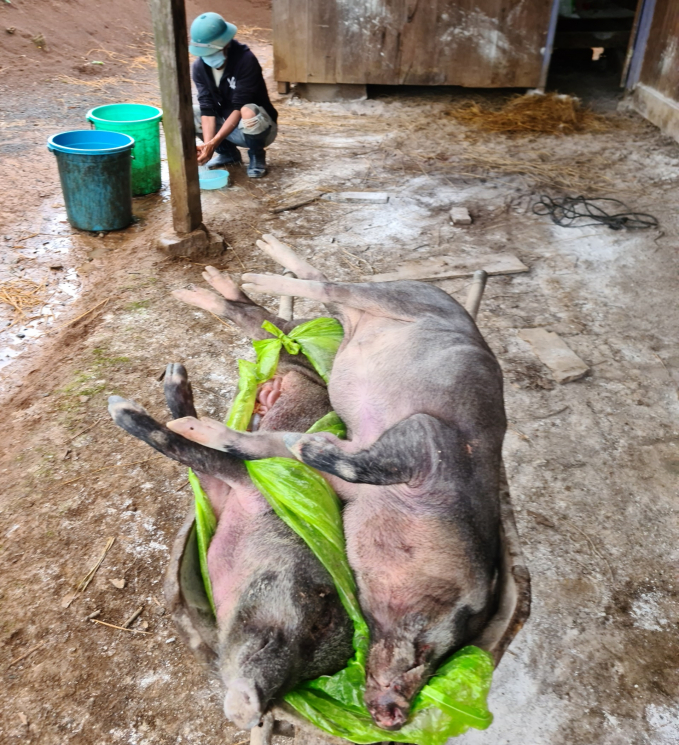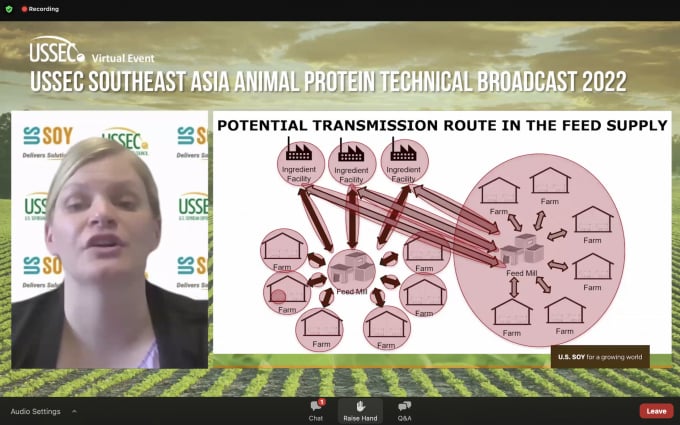June 14, 2025 | 20:43 GMT +7
June 14, 2025 | 20:43 GMT +7
Hotline: 0913.378.918
June 14, 2025 | 20:43 GMT +7
Hotline: 0913.378.918

African swine fever is a threat because there is no vaccine to prevent the disease. Photo: Tuan Anh.
On February 22, experts from world-famous universities offered their perspectives on the ASF situation at the virtual technical broadcast of protein animals held by the U.S Soybean export council (USSEC). The African Swine Fever is a big threat to the regional swine industry as the virus spreads to 17 Asian nations including Vietnam till February 5, 2022. Although the ASF virus is impossible to transmit to humans yet it produces a high rate of fatality among pigs and hogs with rapid spread. As a result, vaccine research and development is a critical option to cope with the disease in long run.
According to Dr. Cassandra Jones, Professor in Kansas State University (US), there are three sets of contenders in the ASF vaccine development race comprising naturally attenuated vaccine, cell-passage attenuated, and gene-deleted attenuated. Of this, creating vaccination by deleting the I177L gene (or ASF-G-ΔI177L in brief) exhibits 100% protection against virulent field strains from Vietnam and effectiveness in local Vietnam breeds and European cross-bred pigs.
Besides the vaccine aspect, the American specialist also underlined the requirement of creating a biological feed mill to restrict the spread of ASF pathogen. Accordingly, the research group did a field study on the ASF virus in Vietnam. The result showed that 17 of 2,328 samples by PCR test from feed supply chain had ASF viral gene. Of which 7 instances relate to feeding trucks, accounting for over half.

Dr. Cassandra Jones, Professor of Kansas State University (USA) shared about the possibility of ASF virus infection in the feed supply chain.
Although the proportion is minor, at 0.7 percent in total sample tests it shows the possible dangers of pathogen transmission during the process of feed supply from the infected area to disease-free areas.
Dr. Casandra also suggested a number of options to prevent the ASF virus from spreading in the feed supply chain, such as ensuring buyers' understanding of feed suppliers, limiting the use of grains from contaminated areas, ensuring biosecurity throughout the food production and transportation system such as building biosecurity feed mills; cleaning and disinfecting the means of transport and production materials regularly…
According to experts, the ASF vaccination race is far from over; numerous promising research projects are being funded by various organizations, and numerous animal experiments are currently under... Thus, the development of an ASF vaccine is closer than ever.
According to the Ministry of Agriculture and Rural Development, a vaccine against African swine fever is scheduled to be announced between the end of the first quarter and the start of the second quarter of 2022, following the completion of trial work. Vietnam now has three businesses studying and manufacturing ASF vaccines: Navetco, RTD, and Dabaco. Additionally, the Vietnam Academy of Agriculture and the Institute of Veterinary Medicine have adopted numerous synergistic solutions in the vaccine's research.
Since January 20, 2022, African swine fever has spread to 321 communes, 36 provinces, and cities, prompting the destruction of about 19,600 pigs.
Translated by Linh Linh

(VAN) The working delegation from the Ministry of Agriculture and Environment conducted an important trip to the Netherlands to strengthen strategic partnerships and sustainable development in the agricultural sector.

(VAN) The letter ‘A Plea from the Ocean’ not only evokes emotion but also awakens the human conscience to the responsibility of protecting life on Earth.

(VAN) The Department of Agriculture in South Africa has announced the country’s first mass vaccination of poultry to prevent local birds from contracting avian influenza.

(VAN) Establishment of the Mekong Delta Regional Agricultural Linkage Center, aiming for a closed value chain, deep processing, trading platforms, and international market connectivity.

(VAN) Gia Lai province has recently recorded 460 rare species of animals and plants, contributing to forest conservation and biodiversity planning in the region.

(VAN) Ms. Caroline Beresford, New Zealand Ambassador to Vietnam, expressed confidence that agricultural cooperation between Vietnam and New Zealand will develop sustainably, be climate-resilient, and promote gender equality.

(VAN) Vietnam reaffirms its commitment to international cooperation in fostering sustainable and responsible fisheries while ensuring resilient livelihoods for small-scale fishing communities.